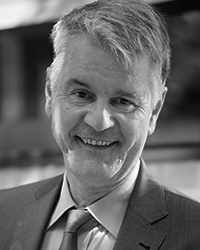
Dr. Thomas Bock
|
Chair for Building Realization and Robotics The research activities of Prof. Bock (b. 1957) center on automation and robotics in construction. All stages are examined, from planning through building activity and useful life to renovation and demolition. After studying architecture at the University of Stuttgart and high rise design at the IIT in Chicago, Prof. Bock did his doctorate on construction automation and robotics at the University of Tokyo. He is the director at the International Association for Automation and Robotics in Construction in Eindhoven, the Asian Habitat Society in Beijing and the International Institute of Construction Information in Tokyo. |

|
|
Prof. Bock is an advisor to the French Ministère de l'Emploi, de la Cohésion Sociale et du Logement . He is a member of the Russian Academy of Architecture and Construction Sciences, the Russian Academy of Sciences and the National Academy of Sciences of Belarus and holds honorary professorship at NPI and honorary doctor of SWSU. Presently, he runs a cross disciplinary MSc entitled "Advanced Construction Building Technology" at TU Munich in its 4th year enrolled by 60 students from 10 disciplines and 35 countries. 1 out of 8/10 applicants get selected for this course. Prof. Bock is also involved in editing "Robotica", "Automation in Construction", the "International Journal of Construction Management", the journal "ACADEMIE" etc. and has about 400 publications. This year he will publish the construction robotics handbook with Cambridge University press starting with volume one on robot oriented design, volume two on robotic industrialization, volume three on construction robots, volume four on automated sites and volume five on ambient robotics. |
Keynote Topic:
Construction Education Challenges: Teaching Automation Robotics Services in Construction and Building
The topics of this course aim at expanding the professional core competence in construction while responding to changing technological, social and ecological circumstances:
New technologies, processes and strategies for designing and producing of buildings
Faster return on investment through implementation of rapid project delivery and zero defect construction by robot oriented design and automated construction systems. E.G. the students who take the Master Course in Advanced Construction and Building Technology acquire a complementary knowledge in design, production, assembly, logistics, and management, emphasizing on information, communication, automation, robotics, mechatronics, and service technologies.
Integration of intelligent systems in daily life and environments
Microsystems and microelectronics increasingly form a part of our everyday’s life. Its miniaturization allows its incorporation in domestic systems and appliances. Simultaneously we want to deal with a standardized and compatible network of synergetic subsystems rather than detached island solutions. On top of conventional construction planning, engineering, and management, these new technologies require an even more complex project management capacity for interfacing the various frontier science disciplines. In order to incorporate mechatronic technologies in intelligent living environments the students acquire basic knowledge of these advanced ICT.
Life cycle management, value engineering and design, innovation
The Master Course follows a holistic approach: The deployment of new technologies is considered in each phase of life cycle originating in marketing and project development till re-use and disassembly. Due to the elementary approach of open systems and subsystems, the life cycle of a building can be extended by upgrading or repairing one element without destroying the whole system. This approach is common in aero space industries. In construction industry a secondary resource utilization helps increasing the total resource efficiency of building performance. The students apply management of technology, processes and projects, its technological interdependencies and socio-economical boundary constraints. By studying intercultural cases in design, production, and management, the students get acquainted to crosscultural experiences for future professional international career.
This Master Course is in tune with actual professional requirements. It responds to a major shift of the professional mainstream away from the traditional core competences of design and build. Economists, lawyers, and others increasingly take over former civil engineer’s and architect’s work load. New technologies create a paradigm change towards establishing new job profiles thus creating new employment opportunities. Conventional competences transform into border competences such as life support systems, mechatronics, ICT and microsystem technology, embedded ambience (environments), sustainable energy design and engineering, real time controlling, innovation management, facility transformation management, etc. To achieve this, the course expands into disciplines such as economy, management, mechanical and electrical engineering, computer science, sociology, and medicine by synchronizing these fields with innovative ambient and construction technology. Future graduates from this course will be trained for cross disciplinary thinking and acting and therefore will be very flexible to adjust to changing professional environments.
Graduates of the Master in Advanced Construction and Building Technology may choose from a wide range of promising professional activities, such as:
- Research and development in larger companies: Design, development, and optimization of building systems and components Innovative materials, advanced logistics, supply chain management, IT and robotics HVAC systems, industrialized production Daily life support systems, intelligent buildings, smart homes
- Facility and building management: Aging society, home care, life support systems Ambient assisted living, embedded systems, ubiquitous computing Microsystems technology, microelectronics, mechatronics
- Marketing research and oriented universal design
- Housing industry: Development, consulting Mass customization, automated production of building systems, construction machinery equipment Project management and engineering
- Government agencies
- Decentralized energy harvesting
- Sustainable concepts for extreme environments like dessert, tundra, artica, ocean • Investment firms, space construction, space habitat
- Academic careers
Any larger corporation which is technology and innovation driven can survive as a global player, designing, engineering, producing, and servicing its core business 24/7 around the globe. Here our global course network and our 10 years of international experience in Europe, Asia, and America permeates into course work, well equipping our graduates for a promising global and intercultural career thus preparing future graduates for global challenges.
Chair of Building Realization and Robotics: (








